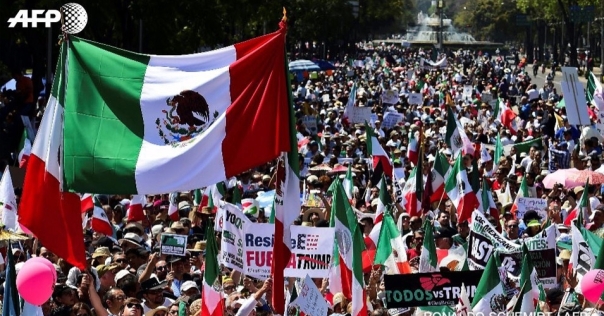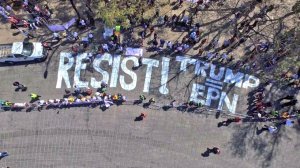Globalizing Resistance in Mexico

Upwards of 20,000 people protest the language and policies of the current U.S. administration
The week of Andrew Puzder’s withdrawal as nominee for U.S. Secretary of Labor also marks the fourteenth anniversary of the largest world wide protest in the history of our species. On Feb. 15, 2003 anti Iraq War protests in nearly 800 cities across the globe brought into the streets, according to the Guinness Book of World Records, between 12 and 14 million people. British Member of Parliament and peace activist Tony Benn described it as “the first global demonstration, and its first cause is to prevent a war against Iraq”. That day, Bishop Desmond Tutu of South Africa met with then Secretary General of the United Nations Kofi Annan and declared, “those people marching in all those cities around the world, we claim the United Nations as our own. We claim it in the name of our global mobilization for peace.”
This February week of 2017, in the aftermath of the weak responses of the Mexican government to the current U.S. administration’s threats, thousands of people marched in protest in twenty Mexican cities. “We are all migrants. We are all one. This is a time to build bridges, not walls,” said 73-year-old protester Jose Antonio Sanchez, who was marching with his nine-year-old granddaughter. With neither the U.S. nor the Mexican administration inclined or able to “build bridges” now, it is the protests on both sides of the border that reveal the common ground that unites our peoples.
On the Mexican side, the end to government subsidized gasoline prices recently led to a twenty per cent increase at the pump. On the U.S. side of the border, big oil is riding high under the new administration with endorsement of the Dakota Access Pipeline and an EXXON executive as Secretary of State. In the recent auction of Mexican oil deposits, BP, who brought to the U.S. Gulf waters the Deepwater Horizon disaster, was one of the big winners. The major oil companies all claimed victory back in 2013 when the Peña Nieto administration announced as part of its Energy Reform the sale of the prized off shore Mexican oil fields. Ali Moshiri, president of Chevron Africa and Latin America Exploration and Production, told reporters shortly after the 2016 auction. “Everybody in the oil and gas sector is interested in Mexico, especially the deepwater.”
For Mexicans, in addition to the nearly $3.50 per gallon cost of gasoline, the privatization and

Widespread opposition to the new U.S. administration and to the EPN administration in Mexico is helping bridges to U.S. resisters.
Mainstream and moderate Mexican political commentators are calling on Peña Nieto to stop appeasing and stand up to the U.S. threats but given the Mexican President’s woeful approval ratings that’s not likely to happen without more mass demonstrations. For a more humane, peaceful and equitable world, we all need more manifestations of global resistance like the February 15, 2003 anti Iraq War mobilization. The day after that historic wave of protest and resistance, the New York Times referred to the people’s rising up as “the second superpower”.
One of the New York City movement organizers, Phyllis Bennis of the Institute for Policy Studies, summed up what the demonstrations achieved with these words: “Our movement changed history. While we did not prevent the Iraq war, the protests proved its clear illegality, demonstrated the isolation of the Bush administration policies, helped prevent war in Iran, and inspired a generation of activists. February 15 set the terms for what ‘global mobilizations’ could accomplish.” Such mobilizations remain the most powerful deterrent to the threats to world peace, health and sustainable development posed by the current U.S. administration.
************ **************** ************
With gratitude for the Phyllis Bennis article on the Institute for Policy Studies web site at
http://www.ips-dc.org/february_15_2003_the_day_the_world_said_no_to_war/
Posted on February 16, 2017, in Uncategorized and tagged 2003 Anti Iraq War Protests, Mexican Produce Exports to U.S., Mexico Protests U.S. Administration. Bookmark the permalink. Leave a comment.
Leave a comment
Comments 0